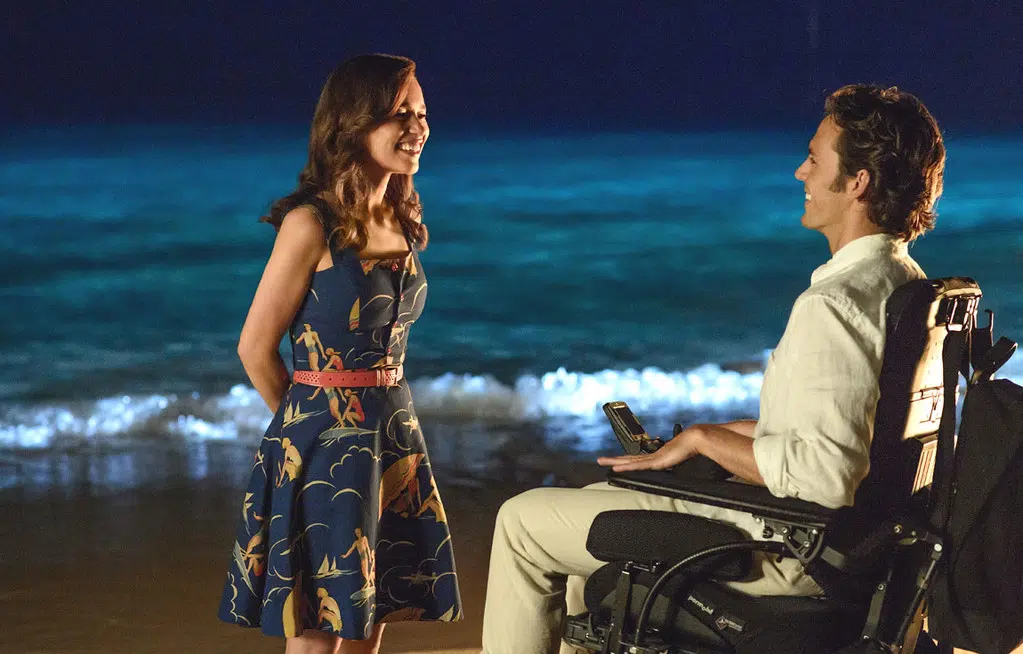The film adaptation of Jojo Moyes’ 2012 novel, Me Before You, tells the love story of cheerful caregiver Louisa Clark and disheartened, handsome quadriplegic Will Traynor. What could be a story about the redemptive power of love instead insidiously and heartbreakingly ends as Traynor commits assisted suicide with Clark by his side.
The film begins when Clark is let go from her job as a cafe waitress and is forced to look for new employment. In her small town, the only available job is a caretaker position for a paralyzed man, the wealthy Will Traynor.
At the start, Traynor, 31, is hostile to everyone and utterly depressed over his disability. Clark, wonderfully portrayed by actress Emilia Clarke, treats him with kindness and respect in spite of his harshness. Eventually, the two become friends. When she overhears Traynor’s parents discussing his plan for assisted suicide, Clark sets out on a mission to show him that life is worth living.
Their love for one another comes softly. He shows her foreign films for the first time. She brings him to a classical concert. To Clarke’s delight, he buys her a pair of black and yellow striped tights for her birthday, her favorite article of clothing as a child. On a moonlit beach, Clark confesses that she loves him, and asks him to live.
But Traynor rejects her love for fear that she might one day pity and resent him. He doesn’t want Clark to miss out on all the things an able-bodied man could give her.
But more than thinking of her, he thinks of himself. He wants his mobility, his “old self” back. He is determined to end his own life, even though his parents and Clark beg him to stay. Without an understanding of God or heaven, he sees no worth to his deep suffering.
Much of Traynor’s decision seems to be motivated by his definition of living. Before the accident that left him paralyzed, Traynor was a powerful executive who loved to travel and play sports. He constantly invalidates Clark’s small-town life. Taking care of her beloved family and waitressing, two things she enjoys, are seen as “not living.”
It’s no wonder, then, at the end of the film, he gives her money to go to college and travel to Paris, unencumbered by financial constraints or him. “Don’t think of me too much- I don’t want you to be sad,” he writes her in a letter to her, as if the avoidance of suffering should be life’s ultimate goal. “Just live,” he tells her, as Clark triumphantly walks through the city. His death – it seems – is not at all a loss, but ultimately a gain for those who loved him.
St. John Paul II’s Love and Responsibility defines what it means to truly love someone, a definition “Me Before You” completely misses. John Paul writes, “Love consists of a commitment which limits one’s freedom – it is a giving of the self. … Take away from love the fullness of self-surrender, the completeness of personal commitment, and what remains will be a total denial and negation of it.”
To love a disabled person requires great self-sacrifice, but Traynor does not understand that all love requires sacrifice. Clark’s life with Traynor would have been difficult. But without it, she loses the gift of him as an unrepeatable, invaluable, complex human being.
Though Clark initially is against Traynor’s suicide, she eventually goes to his deathbed after a talk with her father, who reminds her that one cannot control another person’s choices. “Then what can you do?” she asks, distraught. “You love them,” he replies.
Yet truly loving someone does not necessitate supporting all their choices. Christ showed great mercy to the woman caught in adultery, yet did not condone her actions. Clark would have done the far more loving thing by standing firm in her resolve to be totally uninvolved with the ending of a life.
Traynor dies in a pure white room in a Swiss clinic, awkwardly making jokes about his own suicide to lighten the mood. The death is not shown – that would be far too realistic – and instead, a green leaf symbolically falls to the ground: a young life cut down in its prime.
Despite appearances, the film does not go out of its way to justify assisted suicide. If anything, Traynor’s pain and suffering is whitewashed and barely used as a justification for his actions. All the rhetoric on the morality of his death is boiled down to simple, relativistic one-liners like, “It’s his choice.”
Rather, it seems Traynor’s inarguably tragic death is simply meant to prey on moviegoers’ emotions. Indeed, at the press showing, the promoters handed out boxes of tissues with the movie’s extremely ironic hashtag #LiveBoldly.
Traynor often mentioned that Clark has potential – potential that he will stifle if he goes on living. “Me Before You” also had great potential.
It had the potential to show that disabled people are capable and deserving of love, both romantic and platonic. It had the potential to inspire able-bodied people to make the world a more welcoming place for the disabled. It had the potential to show that people with hardships need not give into despair, that they are not merely burdens on their loved ones.
All that potential was lost when “Me Before You” chose to portray a heartrending love story and a hot-button topic rolled into one.
Rated: O, morally offensive. Motion Picture Association of America rating, PG-13 – parents strongly cautioned. Some material may be inappropriate for children under 13.
Di Mauro can be reached at [email protected] or on Twitter @zoeydimauro.



